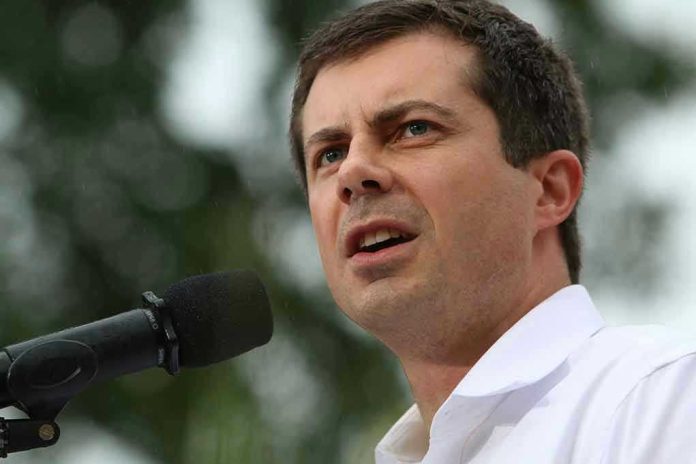
Pete Buttigieg’s remarks at the Texas Tribune Festival have sparked a significant debate by labeling Vice President JD Vance as a potential “fascist,” raising questions about political identity and rhetoric.
Story Snapshot
- Pete Buttigieg criticized JD Vance’s political consistency at a high-profile event.
- Buttigieg’s use of the term “fascist” in a mainstream political context is controversial.
- JD Vance’s political evolution from Trump critic to supporter is under scrutiny.
- The incident underscores the heightened polarization in U.S. politics.
Buttigieg’s Stark Critique of Vance
At the Texas Tribune Festival, Pete Buttigieg addressed a provocative question posed by The Atlantic’s Editor-in-Chief, Jeffrey Goldberg, about whether JD Vance is a “fascist.” Buttigieg’s response was both direct and scathing, highlighting what he perceives as Vance’s fluid political identity. Buttigieg suggested that Vance’s allegiance shifts with convenience, recalling Vance’s past criticism of Donald Trump and subsequent alignment with him, illustrating a pattern of opportunism.
This public critique by Buttigieg has resonated widely, reflecting a broader concern about the ideological trajectory of prominent political figures. The use of the term “fascist,” while provocative, indicates Buttigieg’s serious concerns about the implications of Vance’s political positioning for American democracy. The discourse following Buttigieg’s remarks highlights the contentious nature of political labels and the responsibility of public figures in shaping political narratives.
Vance’s Political Journey
JD Vance’s climb to political prominence has been marked by significant shifts. Initially recognized as a critic of Donald Trump, describing him as “Hitler” in 2020, Vance later embraced Trump’s political movement. This transformation culminated in his selection as Trump’s vice-presidential running mate in 2024. Vance’s critics argue that his political metamorphosis reflects a lack of ideological consistency, whereas his supporters view it as a pragmatic adaptation to the political landscape.
Buttigieg’s critique taps into this evolving narrative, questioning the genuineness of Vance’s political commitments. Such discussions are critical in an era where political allegiance can be perceived as flexible, raising concerns about the broader implications for governance and democratic principles.
Political Ramifications and Public Reaction
The fallout from Buttigieg’s comments has been swift. Social media platforms and news outlets are abuzz with reactions ranging from support for Buttigieg’s boldness to criticism of his rhetoric. Vance’s office responded by defending his record and dismissing Buttigieg’s remarks as reckless. This exchange illustrates the current political climate’s volatility, where rhetoric can quickly escalate into a national conversation.
The debate over Vance’s political identity and Buttigieg’s critique is a microcosm of the larger ideological battles playing out in American politics. As the 2028 elections loom, such discussions are likely to intensify, influencing voter perceptions and party dynamics.
The Broader Impact on Political Discourse
Buttigieg’s remarks and the ensuing debate underscore the complexities of political discourse in today’s America. The use of charged language like “fascist” brings historical weight and demands careful consideration. While some view Buttigieg’s comments as necessary to highlight perceived threats to democracy, others argue for restraint, emphasizing the potential for such rhetoric to further polarize the electorate.
As political figures navigate this contentious landscape, the responsibility to engage constructively becomes paramount. The dialogue surrounding Buttigieg and Vance serves as a reminder of the enduring importance of principled political discourse and the impact of leaders’ words on public perception and democratic health.




